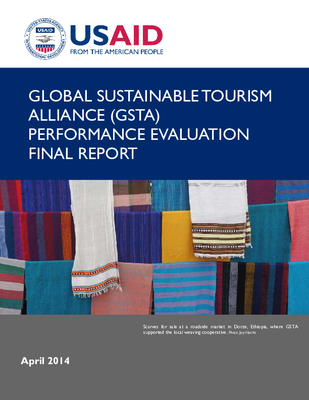Global Sustainable Tourism Alliance (GSTA) Performance Evaluation Final Report

Author(s): Hecht, Joy, Mitchell, Arthur
Publication Date: 2014
Location: Africa: Ethiopia, Mali, Uganda. Latin America and Caribbean: Dominican Republic, Ecuador. Europe: Montenegro.
DOWNLOAD FILEThis evaluation focused on global issues and Washington core support for the GSTA Project. Information for the assessment came from key informant interviews with individuals within the GSTA partner institutions, a review of documents on both leader awards and country projects, and visits to two of the six countries, Ethiopia and Uganda, where GSTA field programs were implemented. Insights from the field were integrated into an assessment of the five evaluation questions
Information relevant to Learning Questions:
Are enabling conditions in place to support a sustainable enterprise?
- Stakeholder alignment
- Market demand, access to credit/capital
- Ownership, governance
- Business alliances
- Technical capacity
- Infrastructure
- Benefit sharing, targeted participants, biodiversity linkage, policies for and enforcement of resource use, external disturbance
Does the enterprise lead to benefits to stakeholders?
- Increased income for participants
- Non-cash benefits
Do the benefits lead to positive changes in attitudes and behavior?
- Not addressed
Does a change in stakeholders’ behaviors lead to a reduction to threats to biodiversity (or restoration)?
- Residential and commercial development
- Agriculture and aquaculture
- Biological resource use
- Invasive and other problematic species and genes
Does a reduction in threats (or restoration) lead to conservation?
- Forest ecosystems
- Freshwater ecosystems
- Grassland ecosystems
- Marine ecosystems
- Species
Enterprise Types:
- Crops
- Livestock: cattle
- Sustainably harvested timber products
- Sustainably harvested fish and shellfish
- Marine/freshwater ecotourism
- Terrestrial ecotourism
- Other natural products: handicrafts, beekeeping
- Other businesses
Document type:
- Evaluation
- Report


